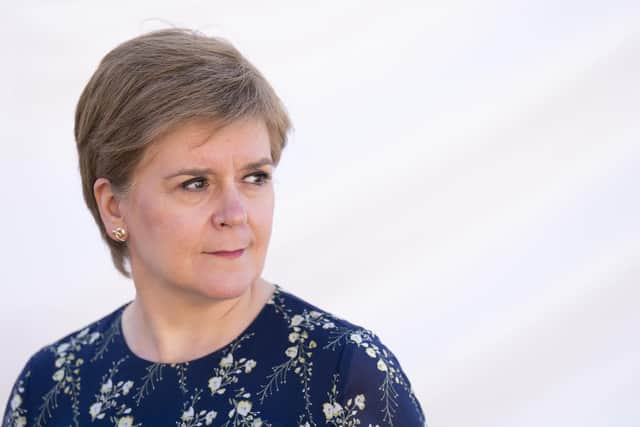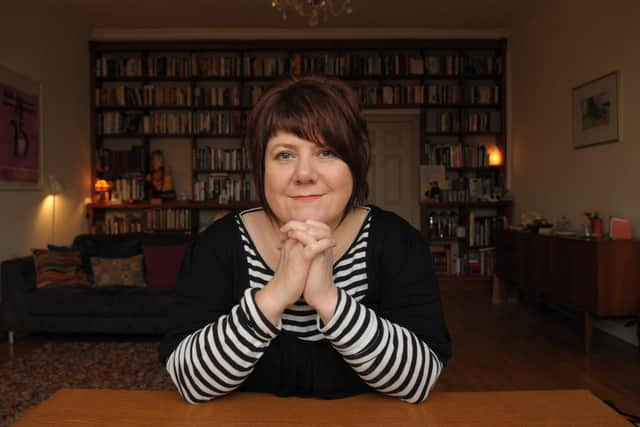Nicola Sturgeon says she is 'horrified' about gay couples being 'nervous' about public affection
The First Minister admitted she is often told that gay couples are still too “nervous” about public display of affection.
Speaking at the Edinburgh International Book Festival, the First Minister suggested the country may be “regressing” despite the introduction of key legislation since the advent of the Scottish Parliament.


Advertisement
Hide AdAdvertisement
Hide AdDuring an in-conversation event with Glasgow author Louise Welsh on Monday, the First Minister recalled the “horrible time in politics and public discourse” during the Keep the Clause campaign in Scotland to try to keep in place controversial legislation banning the promotion of homosexuality in schools.
Welsh was appearing at the festival to discuss The Second Cut, the sequel to her acclaimed 2002 Glasgow-set debut novel The Cutting Room, and the return of its main protagonist, gay auctioneer Rilke.
Ms Sturgeon described Rilke as “one of the most fascinating characters in modern Scottish literature”.
The First Minister aid: “Obviously sexuality is a theme of both of these books. One of the benefits of there being 20 years apart is that you can really demonstrate the massive societal changes that happened in that 20-year period.


“The Cutting Room has a backdrop of the repeal of Section 28, which was a horrible time in politics and public discourse. The Second Cut opens with a gay marriage.”
Welsh said: “There has been an amazing change. The Cutting Room was written when the Keep the Clause campaign was at its height. I would step out of my house and see huge billboards saying things like ‘I am father and this is why I want to keep the clause’.
“As we went about our general business we would have this hateful stuff, slurs against LGBTQ+ people. Thankfully the clause was repealed.
Advertisement
Hide AdAdvertisement
Hide Ad“I wanted to start this new book with a moment of joy, that recognises this change, with an equal wedding between two men, who have been together for 20 or 30 years, and who have now decided to tie the knot.”
Ms Sturgeon said: “These books go from Section 28, a time in our recent history, when I guess gay couples would not have felt comfortable holding hands in public, to the present day, with equal marriage, and everybody feeling that things have changed completely, and yet have they changed that much?
"I am horrified often right now when I hear gay couples say that they are nervous again about public displays of affection. These battles are never definitely won. Do you think progress is continuing to go forward or are we regressing a little bit?”
Welsh said: “I think we have to keep on going. We have to keep on fighting.
“We are sitting here in Edinburgh, at a fantastic international festival. We are aware that in 35 countries in the Commonwealth it is still illegal to be gay.
"We look at ourselves and we look elsewhere. We look across the Atlantic to America, where laws are beginning to be threatened to be rescinded in terms of equal marriage. We have to always be vigilant.
"Those of us who have the luxury to be open and out, that is something we should do.
Advertisement
Hide AdAdvertisement
Hide Ad"I think to be visible if you can is a hugely important thing. We can’t relax.
“The world has changed enormously. I am professor of creative writing at the University of Glasgow. When Edwin Morgan was a professor there, he could not be out.
"People could not be out in the way we are. That feels like an enormous privilege and an enormous right.
"I feel lucky to be living in these times, but I don't feel completely relaxed."
Ms Sturgeon said: “There is a lovely, quite funny scene in the book in George Square, where there is a demonstration with trans and non-binary people, where Rilke and Les are bemused by this. It is a lovely way of reflecting some of the developments in the debates around gender identity. Were you at all nervous about broaching that?”
Welsh said: “With any attempts to looking at the world with queer eyes, identity is going to be part of that story. Things have changed.
“There are two different groups in George Square who are having a bit of a rammy about somebody who is going to speak at the City Chambers. Les and Rilke don’t quite get this, but they have some younger people in tow, who are more switched on about their identities who say their are non-binary queers. Les and Rilke have a little bit of trouble getting their heads around it.
Advertisement
Hide AdAdvertisement
Hide Ad“They are guys who will have faced a lot of prejudice and a lot of physical jeopardy.
“They are meeting young people who are explaining things to them. There is a huge uncomfortableness there because they feel they have fought hard and now have to listen to other people as well. That’s the natural way of the world.
“Suddenly you wake up and realise you are an old codger, and that things are going on and you may not understand all of them.”
Asked why she had waited 20 years to write a follow-up to The Cutting Room, Welsh said: “You have to really feel it. I was invited to write a sequel to The Cutting Room many times.
“It really changed my life. It was my first book. It did a lot better than I thought it would. It is a novel which has an LGBT character at the centre and foreground, and is set in Glasgow. I thought it was a a book that maybe some gay people in Glasgow would read.
“I felt I had to really feel it to want to go back to that world and to do it well. Perhaps it took 20 years and for things to change a little for me to think that I could go back.”
Comments
Want to join the conversation? Please or to comment on this article.

